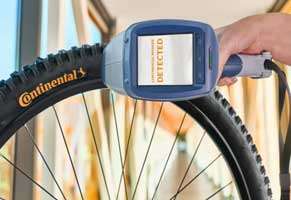
German tyre maker Continental and Security Matters (SMX), a tech platform specialising in digital tracking using unalterable chemical-based barcodes, have succeeded for the first time in verifying a marker substance for natural rubber in a tyre, and thus throughout the entire production process.
The dedicated marker technology, which both companies optimised for use in natural rubber, is designed to create greater transparency along the entire value chain of tyres and technical rubber products from Continental.
Provided with special security features, the use of the marker substances enables the invisible marking of natural rubber with information on its geographical origin. This means, for example, that responsibly sourced natural rubber and its origin can be verified at every stage of the supply chain all the way to the customer. By doing so, Continental says it is further strengthening its pioneering role in its commitment to greater transparency along its supply chain.
In the successfully completed field test, the marker substance underwent and passed a real test of resilience. The substance was added to responsibly grown latex during harvesting and withstood not only the intensive preparations involved in the production of natural rubber but also the tire manufacturing process itself.
In the manufactured tyre, the data was retrieved using special, purpose-built software and a reader, and correctly interpreted. The appearance and performance of a bicycle tyre containing the invisible marker remained unchanged.
For the field test, natural rubber grown as part of a joint project run by Continental and the German development aid agency ‘Deutsche Gesellschaft für Internationale Zusammenarbeit’ (GIZ) in the Indonesian province of West Kalimantan was used and provided with the markers. The project focuses on education and digitalisation as the keys to establishing sustainable supply chains for natural rubber. Local smallholders were taught how the marker substances work and in what concentration they need to be added to the latex.
Now that the technology has passed its first test of resilience, Continental is planning to use the new marker technology on a larger scale in the future during the process of sourcing its rubber and also to integrate it in other rubber products. As part of the industrialisation of this technology, it is conceivable to link the markers with blockchain technology, which is particularly tamper-proof. This could provide additional support for tamper-free monitoring of compliance with quality standards and quality criteria along the complex supply chain of natural rubber.
By 2050 at the latest, the company is aiming to use 100% sustainably produced materials in its tyres and wants to achieve full climate-neutrality along its entire value chain.
